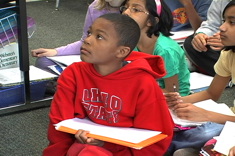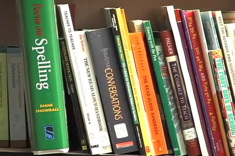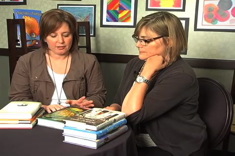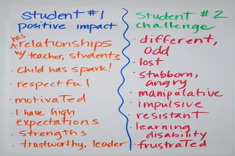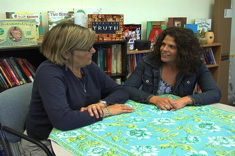Melanie Quinn
Melanie Quinn is a fourth-grade teacher in the Evergreen (Washington) School District. She previously worked in the same district as a literacy coach.
All Content
Conventions and Keeping It Real
Melanie Quinn uses her fourth graders love of drama to create a fun activity for learning how to integrate quotations into writing.
What’s the Most Beautiful Thing You Know About . . . ?
Ruth Shagoury and Melanie Quinn asked their colleagues to share the “most beautiful thing” about the puzzling student each of them is looking at closely in their study group. This is a great activity if you’re looking for a quick and easy icebreaker to spark some positive energy in your next study group or staff meeting and to remind everyone of the joys of our profession.
Words of Wisdom and Passing the Torch
Melanie Quinn shares a fun activity to help current students share advice for next year’s class.
It’s Not Wrong. It’s Almost Right.
Melanie Quinn reconsiders how she teaches spelling in her fourth-grade classroom, establishing a new whiteboard routine.
Creating the Future
Melanie Quinn shares a quick activity to help teachers visualize their hopes and dreams at the start of the school year.
That Student: Ending the Year with a PD Celebration
Melanie Quinn shares a simple professional development activity that helps teachers focus on growth through the year, based on their experiences with one child.
Never Too Late to Get to Know You
Melanie Quinn shares two rituals for staff meetings to build camaraderie and community.
The Children Are Communicating. Are We Listening?
Melanie Quinn realizes our classrooms are filled with mini-coaches. The students in front of us are clearly communicating their needs; we just need to do a better job of paying attention.
Do or Die
Melanie Quinn deals with a panic-stricken young teacher near tears after a lousy evaluation. She explains what she did to move him past emotion and into a plan to improve his instruction.
Developing Life Skills vs. Teaching to the Test
Melanie Quinn and the teachers she works with face the hard truth of low test scores in their school, and develop reflective practices to tackle the issue.
Aligning Beliefs and Practices: Homework Policies
Melanie Quinn shares the process of coming up with a schoolwide homework policy that aligns beliefs and practices across grade levels.
Coaching for Confidence
No matter their level of skill or experience, teachers can find their confidence shaken. Melanie Quinn analyzes some of the reasons for teacher insecurity, and how literacy coaches can help.
New Year Resolutions
Melanie Quinn begins the new school year with a list of habits she plans to develop, from spending more time with new teachers to greeting every child in the building by name.
Engaging Not Blaming: Increasing Parent Involvement
Melanie Quinn and her colleagues try some fresh approaches to tackling the dilemma of low participation in curriculum events for parents.
Inclusion: What Does It Mean?
Melanie Quinn chronicles the changes her school staff has gone through in defining and designing inclusion programs, from the “rolling cart” year to the time when all horseshoe tables vanished. This year, the staff finally got on the same page by creating a document defining their beliefs about inclusion.
It’s All About Perception
Literacy coach Melanie Quinn works with teachers to help them move beyond deficit-based thinking in analyzing assessments.
One Task Fits All
Melanie Quinn wonders if the "sit and get" agenda for a full-day inservice needs to be upended to acknowledge the struggles teachers are facing in meeting assessment demands in the district.
The Honeymoon Is Over
The warm, fuzzy feelings of back-to-school goodwill are gone by this point in the fall. Melanie Quinn designs a professional development session to help teachers reflect on classroom needs and develop some new strategies for strengthening classroom communities.
The Common Core and Parents: Building Bridges, Not Walls
Melanie Quinn works with teachers to make language less standards-based and more invitational in conferences with parents.
Coaching Relationships: Move Closer
Melanie Quinn has a poor start in her coaching relationship with a teacher. She begins again by going against her natural instincts, and is surprised by the results.
Because It’s the Right Thing to Do
The staff at Melanie Quinn's school realizes they have created a monster with positive reinforcement through extrinsic rewards. Here is how they changed behaviors and expectations over a two-year period.
Struggling Teachers? Don’t Force It
Melanie Quinn confronts the dilemma that vexes many coaches: how to support struggling teachers who are required to receive coaching, whether they want the help or not.
Worth the Investment
Melanie Quinn finds it is worth taking time for community building in schools and classrooms, because the practice pays dividends all year long.
Seizing a Coaching Opportunity
Melanie Quinn develops a new appreciation for a fifth-grade teacher’s struggles with her class, and finds an opportunity to open a conversation about student motivation and community building.
Where Am I Going and How Did I Get Here?
Melanie Quinn shares a simple professional development activity to help teachers match their beliefs and practice.
Coaching Conference Early in the Year
Melanie Quinn meets with kindergarten teacher Neisha in this brief conference, asking her to share her goals for the year in changing writing workshop, as well as how Melanie can assist her as a coach.
Puppies and Babies and Kittens, Oh My! Support for Maternity Leaves
Are you experiencing a new “baby boom” among teachers in your school? Melanie Quinn has advice on assisting in classrooms where teachers are going on maternity leave.
Taking a Fresh Look at PLCs
Melanie Quinn finds that a shift in location for her school's Professional Learning Communities (PLCs) makes all the difference in increasing the quality of the meetings.
High Expectations? Looking for Evidence
Melanie Quinn reflects on the profound implications of the high or low expectations teachers have for students, and the coach's role in changing them.
Supporting New Teachers and Appreciating Their Gifts
Melanie Quinn thinks through the two common "phases" of early-career teachers, and creates a checklist of guidance they will need from literacy leaders.
Keeping It Real for Students: Never Underestimate the Power of Reflection
Melanie Quinn consoles a teacher who is recovering from a disastrous lesson captured on video, and shows the power of a “do-over” for both teachers and students.
From Teacher to Coach: Building Community in the Early Days
The transition from teacher to coach is tricky. Melanie Quinn has advice for building relationships with colleagues in the first weeks of school.
Professional Development and Then What? How to Keep Learning Alive Long After the Staff Meeting
Melanie Quinn mulls over the challenges and distractions that hamper transfer of learning from professional development sessions to classroom teaching.
Hindsight: What I Wish I’d Known Before My School Burned Down
Melanie Quinn shares lessons from the fire that burned down her school.
I Can’t Quite Put My Finger On It
Have you ever had a teacher enthusiastically embrace a new "magic bullet" instructional program that includes scripted or rote elements that concern you? Melanie Quinn considers this sticky situation instructional coaches sometimes find themselves in, and comes up with some starting points for conversations with colleagues.
The Power of Linking Words and Perceptions
Melanie Quinn relays a powerful practice for staff members to reframe language and perceptions while putting common labels for students in a whole new light.
Loops and Blended Classrooms: Practical Tips to Start the School Year
It can feel like “old home week” when you have students returning to your classroom for a second year. But blending and looping both present their own special challenges during the first days of school. Melanie Quinn has advice for getting the year off to a good start.
I Can’t Quite Put My Finger On It
Have you ever had a teacher enthusiastically embrace a new “magic bullet” instructional program that includes scripted or rote elements that concern you? Melanie Quinn considers this sticky situation instructional coaches sometimes find themselves in, and comes up with some starting points for conversations with colleagues.
Supporting New Teachers and Appreciating Their Gifts
Melanie Quinn thinks through the two common "phases" of early career teachers, and creates a checklist of guidance they will need from literacy leaders.
Trying to Coach Without the Budget in Mind
Melanie Quinn makes a somewhat surprising discovery in the midst of the budget cutting season. The best way to justify her literacy coaching position is to do less – but do everything extraordinarily well.
Keeping It Real for Students: Never Underestimate the Power of Reflection
Melanie Quinn consoles a teacher who is recovering from a disastrous lesson captured on video, and shows the power of a “do-over” for both teachers and students.
Best Practices All Day Long: Balancing Personal and Professional Success
If you’ve ever experienced that disequilibrium of feeling completely organized in your professional life, and hopelessly scattered during your personal time, you’ll enjoy Melanie Quinn’s reflective essay.
The Power of Linking Words and Perceptions
Melanie Quinn relays a powerful practice for staff members to reframe language and perceptions while putting common labels for students in a whole new light.
From Teacher to Coach: Building Community in the Early Days
The transition from teacher to coach is tricky. Melanie Quinn has advice for building relationships with colleagues in the first weeks of school.
Coaching Beyond the Curriculum: Reframing Our Talk and Attitude Toward Difficult Students
What role should literacy coaches have in helping teachers manage unruly students? Melanie Quinn settles into a morning of poring over assessment data, only to have it interrupted by a child who has been disrupting his class. Her interactions with Darren and his teacher lead to strategies for helping colleagues take an inquiry stance with challenging children.
What’s the Most Beautiful Thing You Know About…?
Ruth Shagoury and Melanie Quinn asked their colleagues to share the “most beautiful thing” about the puzzling student each of them is looking at closely in their study group. This is a great activity you’re looking for a quick and easy icebreaker to spark some positive energy in your next study group or staff meeting, and remind everyone of the joys of our profession.
New Teacher Conversations: Breaking Through Roadblocks and Sustaining Support
The roadblocks activity can easily be adapted for study groups looking at almost any topic.

